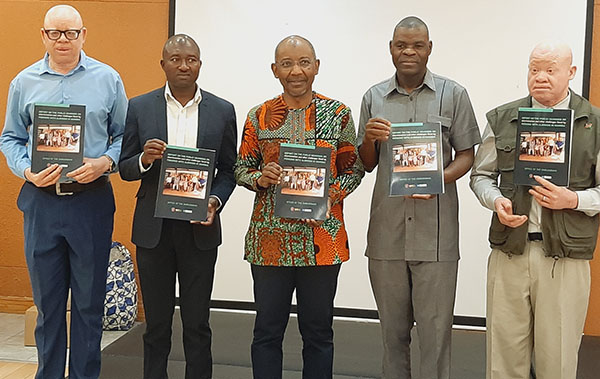Festus Hamalwa
ONGWEDIVA – Ombudsman Basilius Dyakugha says hateful names and slurs further contribute to the violation of the right to dignity of the people with albinism. He said this during the launch of the report on issues faced by the people with albinism in Namibia in Ongwediva yesterday.
Dyakugha said hateful name calling is degrading and inhumane. “Let us refer to such persons respectfully by their names as individuals, as they are individual persons before their conditions. Hence, we say persons with albinism,” he urged.
“Respect for one’s dignity is at the core of human rights and humanity and ubuntu as Africans. Ubuntu is an ancient African word meaning ‘humanity to others’. It is often described as ‘I am what I am because of who we all are’.”
He said people with albinism can face discrimination all their lives, they can be denied decent jobs, places in schools and be victims of violence.
“The UN has recommended strong measures to protect their rights. One is for governments, including Namibia, to come up with effective laws against trafficking of body parts of people with albinism,” he added.
He wants to end the human rights violations of people with albinism by addressing the legal vacuum when it comes to trafficking of body parts.
Furthermore, Dyakugha said earlier this year the media reported about a suspected attempt to sell the hair of people with albinism.
“In this regard, I call upon the government and other stakeholders to address the root causes such as the myth and misbeliefs or information about the people with albinism,” he stressed.
He added that albinism knows no boundaries and it occurs in all races and ethnic groups throughout the world and it can also affect any species from land and marine mammals, to birds, reptiles, and even plants.
“Albinism is part of human diversity but not a curse,” he said. Also speaking at the occasion, head of Unesco in Namibia, Djaffar Moussa-Elkadhum has called upon the Youth and Civil Society Organisations to engage and join the efforts of the Africa Albinism Network to promote and advance an inclusive world for persons with albinism free from brutality and discrimination for a more inclusive and just society.
“Unesco and its partner, the Africa Albinism Network, are very proud to be associated with the publication and dissemination of these reports and its annexures by providing the necessary funding. It is our sincere hope and call that the report and its annexures are effectively used for policy and communication targeted actions supporting the enjoyment of human rights by the persons with albinism in Namibia,” he stressed.
At the event, the president of Namibia Albino Association Joseph Ndinomupya expressed his gratitude for the efforts of the Namibian government to ensure that people with albinism are receiving free sun cream, hats, sunglasses and social grants.
“Nowadays we have albinos that are working at various ministries. Children have access to nationality and the right to attend schools,” he added. Ndinomupya urged the public to continue working together to fight discriminating against people with albinism.



